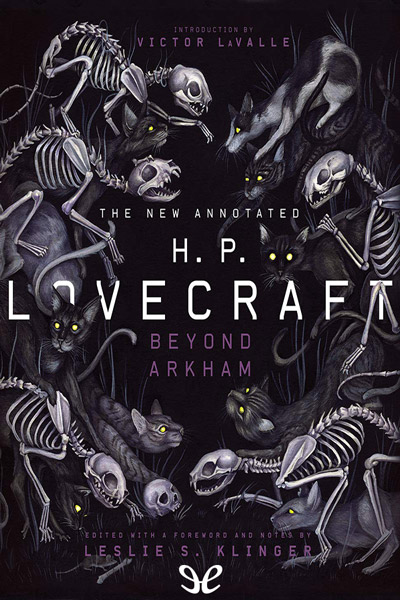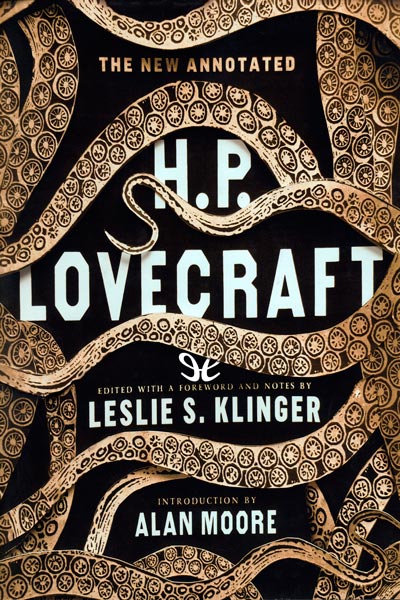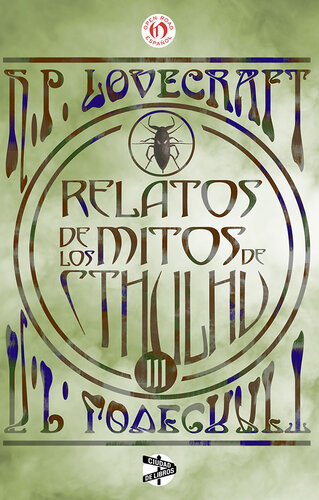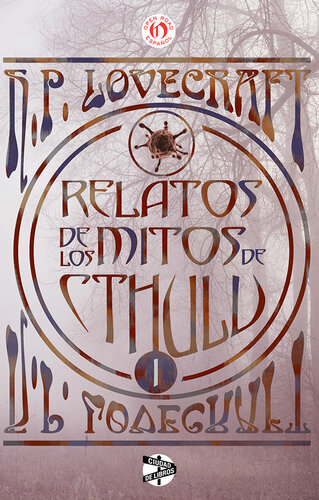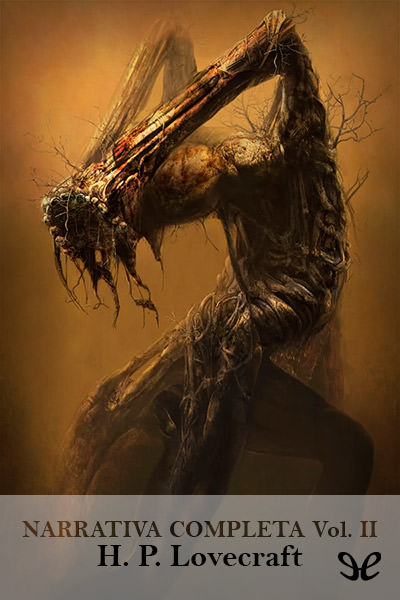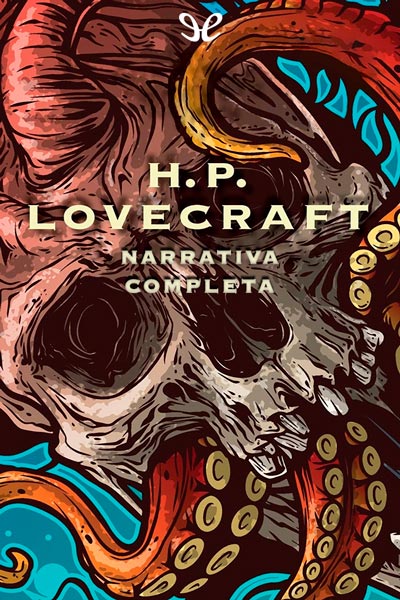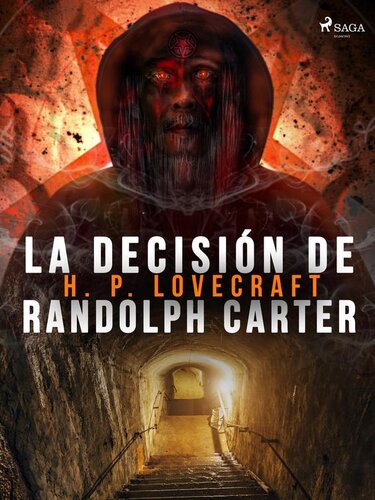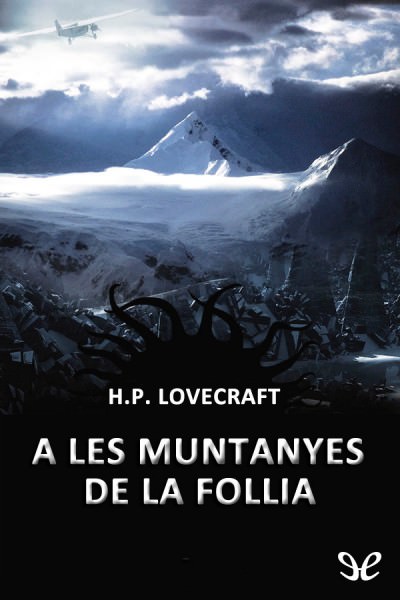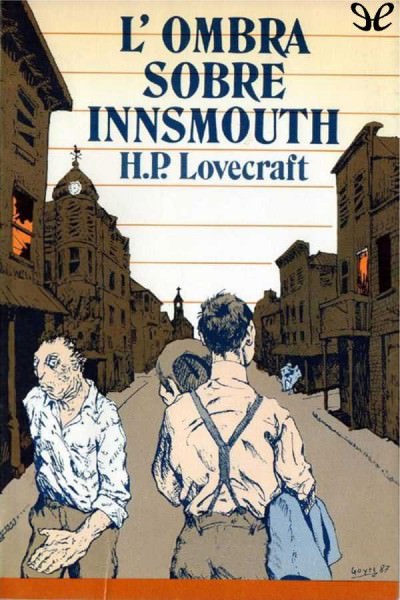oleebook.com
La crida de Cthulhu i altres narracions de H. P. Lovecraft
de H. P. Lovecraft - Género: Terror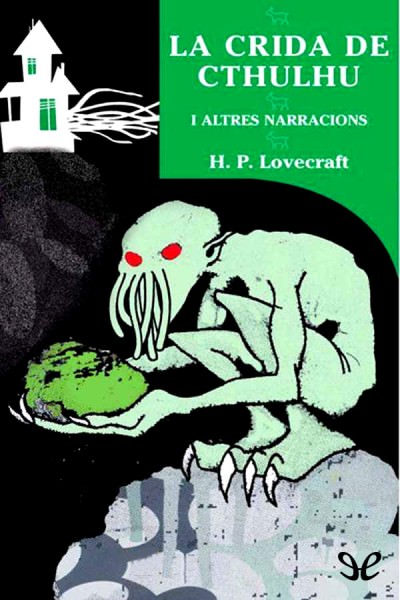
Sinopsis
Aquest recull, concebut com unes succintes obres escollides, permet un coneixement global de lobra del millor Lovecraft. La crida de Cthulhu és una obra mestra de la narrativa en llengua anglesa, i la resta dels relats que integren el volum combinen a la perfecció la qualitat literària i la riquesa imaginativa de lautor més important en làmbit del que ell anomenava lhorror sobrenatural.
La selecció, que abasta la maduresa literària de Lovecraft, cobreix tots els motius centrals de la seva narrativa: la involució humana cap a la bestialitat, la presència amagada, en el món quotidià, de cultes i déssers impensables, les fantasies sepulcrals entorn de supervivències abominables, les civilitzacions prehumanes, els horrors extraterrestres i les originals revisitacions lovecraftianes dels temes tradicionals de la fantasmagoria o el vampirisme.
En el pròleg, Emili Olcina, el preparador de ledició posa de relleu la visió suplicial de la sexualitat que vertebra lhorror lovecraftià.
Libros Recomendados - Relacionados
Reseñas Varias sobre este libro
I am largely underwhelmed by this master of horror. I find the writing simply dull, repetitive, anti-climactic, and that it uses the same tricks over and over and over again. I am not horrified by the stories, or at least not by any intended reasons. The narration, pacing, and lazy writing wreck whatever interest I had in the premises of the stories had, such as the twist to Arthur Jermyn and The Color Out of Space. (Such potential, OH WHY?!)
I admit my strong reaction to these stories is due to the huge hype Ive heard around them and the high expectations I had starting them. After reading some of his most famous works (Call of Cthulhu, Call of Cthulhu, and dont forget, Call of Cthulhu) I am completely lost to why theyve achieved the memetic status theyre at now. Before actually reading anything, I was always delighted to see the occasional CTHULHU-fish emblem on the back of a car or a creative homage to the famed monster on DeviantArt, and I was eager to become a loyal member of the fanbase, but it just wasnt for me.
Here are some notes I jotted down while reading:
- Lovecraft makes random misspellings in an attempt to sound archaic. Shewn, coördinated, reëmbarked, etc. Admittedly this only happens once every couple pages, but its still distracting.
- Every protagonist is exactly the same. It was very horrible but my own scientific curiosity for the horrible made me very curious as to what lay forward. Sometimes the narrators are completely unnecessary, with an obvious case of this being in The Call of Cthulhu, where the narrator summarizes other peoples actions or journal entries, when it would have been much more effective to just show the journal entries or articles themselves.
- There are lazy attempts at shewing horrific things. He will write what is basically a wordy version of And it was so horrible and I could never describe it without going crazy/dead and I really dont want to bring those memories back in my mind so yeah just trust me it was horrible.
- When he does describe actual horror, its not very horrific. And I looked out the window and saw a bunch of weird people chanting and dancing to this big black pyramid and I screamed loudly for what seemed to be an hour in sheer horrible terror.
- Lovecraft uses description of people that human beings do not (and should not) use. The narrator of Cool Air describes Dr. Muñoz as being high-bred. In He, the narrator describes the titular pronoun as bearing the marks of a lineage and refinement. The Call of Cthulhu describes tribal peoples as being mix-blooded. This is just creepy, as most humans do not describe others the same way you would describe a dog. This technique would be effective if it was coming out of the mouth of a character who was meant to be portrayed as inhuman or emotionless, but no, its coming out of the narrator were supposed to identify with.
- Physical improbabilities are rampant. In The Rats in the Walls, theres an enormous lair complete with bottomless ravines underneath an old manor. Uh, why? Enormous mile-high structures will be completely unnoticed in the wild by the world around them, which I find highly unly for the 1920s setting.
- The pacing is distractingly inconsistent. While Lovecraft will never miss an opportunity to describe the scenery and archaic architecture at length, long voyages and passages of time will be handwaved with a few words mid-sentence.
However, I would recommend this edition of the book for someone who wants to start with Lovecraft (even after reading all of this review). It has every story of his Ive heard anyone talk about, the painting on the cover is cool, and Penguin crams all 420 pages into a surprisingly thin width. The Explanatory Notes at the end are in-depth, and well-researched. They dont always add to ones understanding of the story (Cool Air has a note about a fold-out couch Lovecraft kept in his study). While definitely not necessary for getting the full-effect of the stories, theyre interesting to read and Im glad theyre included.
Please leave comments! I want to see if I'm not alone in my opinion, or if I just "don't get it". :P
Super-exaggeration time:
I drove around the old toun while calling my well-bred Negro acquaintance with my iPhewn when I heard a sound that struck me as being from an ancient cosmic terror of terrible horrors buried deep within the crevice of time and the darkest corners of the recurring nightmares of humankind undernaeth the horrors of Old New Yoark. Although I cant pinpoint exactly why I came to this conclusiön but it was of such disturbance to my psyche that I am to leap out of this window in 5 4 3 2-
- - -
2012 UPDATE: No, I still haven't read any more Lovecraft since writing this review. But here are some extra thoughts for clarification: I am completely familiar with the kind of horror Lovecraft aims for, and that his fans love him for. I do love this style of horror (unspeakable, unseen, ancient, and cosmic), and I love it when it's envokedbut Lovecraft was unable to envoke it for me. My main problem with Lovecraft (and most horror out there) is that his stories feel more stories about his narrators getting scared, without myself feeling an iota of involvement. I find that literature is an extremely difficult medium for horror, as it takes an extreme, almost poetic ability to be able to write the perfect description, atmosphere, or even single sentence that begins to spook the readernot just the author's characters. It's not impossible, it's just hard. I can get myself into an intense horrified scizophrenic state before I begin reading, and enjoy the stories much more, but why should I? I went into this author with an open mind, and I wasn't convinced. I shouldn't have to perform "well what if this was happening to me" exercises or stay awake until four in the morning and convince myself there's a murderer behind me to get myself in the mood to properly enjoy horror.longish-260 s5 comments Bill KerwinAuthor 3 books83.3k
This, the first of three volumes of Lovecraft tales edited by S.T. Joshi, is--as are the other two--chronological, featuring a selection of tales from the earliest to the very last. (An odd organizational principle for a complete tales, but I suppose Joshi did this so most of the best tales wouldn't be found in the last two volumes.)
Every Lovecraft fan should purchase all three volumes, butif you must confine yourself to one onlyI would suggest this one as the best to buy, since it contains many of the best and most characteristic tales. Among my favorites are the early Dagon (which foreshadows the Cthulhu mythos), The Facts Concerning the Late Arthur Jermyn and His Family (first appearance of the Lovecraft theme of genetic pollution), Nyarlathotep (a perfectly realized early prose poem), The Picture in the House (a tale of cannibalism narrated by a degenerate old New Englander), The Outsider (Lovecrafts first masterpiece, written in the style of Poe), The Rats in the Walls (an English gothic, involving a literal descent into an ancient world of horrors), The Festival (an underappreciated dream journey through an old New England town, worthy of Ligotti), The Call of Cthulhu (a masterly use of many narrative points of view), The Colour Out of Space (the tale of a mysterious meteor, perhaps Lovecrafts best use of description), The Shadow Over Innsmouth (the secret behind the degenerate denizens of a small New England port, perhaps Lovecrafts best sustained longer work), and The Haunter of the Dark (H.P.s last story, featuring a haunted description of his native Providence and the best concluding sentence in horror fiction).
Also included: The Statement of Randolph Carter, Celephais, Herbert West Reanimator, Cool Air, The Hound, He, and The Whisperer in Darknessall of which are of interestand the excellent introduction and helpful notes of the great scholar of horror S.T. Joshi (particularly good at revealing the connections between Lovecrafts life and his fiction.)
All in all, this is a fine collection, certainly the best of the excellent series of three.short-stories weird-fiction184 s ????1,082 1,949
?? ? ??????
????? ??? ?? ?? ?????? ???? ???? ??? ???? «????? ????: ?????» ???. ????????? ???? ? ???? ?? ????? ???? ???? ? ?????? ???????? ??? ????. ??? ???? ?? ?? ?? ???? ???? ?????. ???? ????? ????? ?? ?? ??? ?? ????????? ???????????. ?????? ????? ? ????????? ???????? ????? ???? ?? ??????? ?? ?????? ?? ?? ??? ????? ????? ? ?????? ????? ????????? ? ?????? ??????? ???? ???? ???????? ?????????????? ?? ????? ???? ????? ???? ??? ? ???? ?? ?????? ?????? ????? ?? ????? ???. ???? ?? ??? ???? ?????? ?? ?? ????? ??? ? ?? ?????? ?? ?????? ?????? ?? ???? ??? ???? ???? ? ?????? ???? ???????? ? ???? ????????.
??? ???? ?????????? ?? ?????? ????? ??????????? ????? ? ????? ? ?????????? ????? ???? ? ???????? ???????? ? ???? ?????????????? ?? ????? ???? ???? ??? ? ??? ?? ?????????? ???????? ?????? ???. ?? ??? ??????? ?? ????? ????? ???? ?????? ?? ???? ?? ?? ????? ???? ??? ?? ??? ????? ???? ?????? ???????? ??? ????.
??? ??? ???? ?? ?????? ?? ???????? ???????? ??? ???? ????? ?? ??? ???? ???? ??? ???? ???? ????? ?? ??? ?? ??????? ?????? ?? ??? ???. ??? ???? ????? ?? ???? ???? ????? ???? ?? ??????? ??? ? ??? ???? ?? ???? ???? ????. ??? ???? ???? ????? ?????? ??? ???? ?? ?? ??? ????? ????? ? ??? ??? ???? ???? ??? ?? ?? ???? ???? ????????????? ?? ??? ????? ? ???? ????? ???? ?????? ?? ????? ???? ?? ?????? ???? ?? ????? ?????. ??? ?? ??? ?? ???? ????? ??? ?? ???????? ? ????? «???? ??????»? ???? ???. ?????? ??? ???????? ???? ? ???? ???? ?????????? ??????? ???? ????? ?? ??????? ?????????? ? ????????? ????? ?? ?? ?????? ???? ?????? ??? ?????? ?? ??????????. ????? ?? ?? ???? ??? ??? ?? ????? ???? ???? ?? ??? ??????? ??? ?????????? ???? ?? ?? ???? ???? ? ????? ?????? ?????? ??? ???? ? ??? ???? ??? ????? ?????????? ?? ????? ???? ??? ? ???? ?????? ??? ?????. ??? ??? ?????? ?????? ????? ??? ? ?????? ??? ? ????? ???? ???? ?????? ?? ???? ? ????? ????? ?????? ? ??? ???? ?? ?????????? ????????? ?? ?? ?? ???? ??????? ? ???? ?????? ?? ????? ???? ? ??????? ?????? ? ???????? ? ?? ?????? ??????.
??? ???? ?? ?? ?? ???? ????? ?????? ?????? ???? ????????? ???? «????? ??????»? ??? ??? ?? ?????? ???? ???????? ??? ???? ????. ???? ???? ??? ?????? ??????? ???? ???? ?? ?????? ????? ?? ???? ? ???? ?????? ???? ?? ?????. ??? ?? ???? ?? ?????? ??? ????? ????? ? ??? ?? ??? ??????? ???? ??????? ??????? ???? ?? ??????? ???. ?? ??? ??? ??? ?? ???? ?????? ??? ?????? ???? ??? ?????? ?? ????? ??? ?????? ???? ?? ???????? ??????? ????? ???? ? ??? ?? ??? ?? ????? ????? ?????. ?? ????? ????? ? ???? ????? ??? ??? ?? ?????? ????? ??? ?? ?? ??????? ?? ???????? ???????? ?????????? ?? ?????.
?? ??????? ?? ???
???????? ???????? ?? ??? ??? ????? ????? ????:
???? ?????? ???? ??????? ???? ???? ??? ???? ?? ????? ???????? ??? «???????? ??????????? ?????????» ? ?????????? ?? ????? ? ????? ??????? ?? ?? ???????? ???? ????? ?? ??? ????? ?? ??? ???? ???? ?? ???? ??? ?? ???? ??? «?? ???? ???? ? ???????????? ??? ? ???? ?? ?????????? ???? ?? ??? ???? ?????? ???» ???? ????? ??????? ???? ???? ?? ?? ????. ?????????? ????? ???????????? ???? ?? «??? ? ???? ???». ? ???????? ???? ?? ???? ?? ????? ?????? ??? ?????? ??????? ?? ???? ??? ? ?????? ?? ?? ????? ??????? ?????.
???? ????? ? ???? ?? ???? ??????? ?????? ???? ???? ?? ???? ????? ????? ????????? ?? ???? ??? ?????? ?? ??? ???. ???? ???? ?? ??? ?? ?????? ????? ??????: ??? ?????? ??????? ??? ?? ?????? ???? ????? ??... ???? ?? ?? ???? ???? ????? ???? ???? ???? ?????. ????? ???? ????? ? ??? ?????? ? ?? ???? ??????? ?????? ????? ??????. ???? ?? ??? ?? ?? ?????? ? ??? ?? ?????? ??????.
??? ???????? ?? ?? ????? ?????? ?????? «?????? ???? ???» ????? ?? ????????? ???? ??? ?????????? ???? ?????????? ? ?????? ???? ?????? ??????? «?????? ???? ???»??? ?? ???? ??? ?? ???? ??? ??? ??? ?????? ?? ??? ?????.??????-????? ?????-?????-??98 s3 comments Scott302 358
"Gentle reader - what I saw that night was so horrifyingly horrible, such a cavalcade of horrid, horrific horror, that I cannot describe its horrendousness to you. I pen these words whilst I foam at the mouth in a padded cell."
That is what almost all of The Call of Chthulu and Other Weird Stories felt to me - a terrified narrator recounts a scarring encounter with an evil force as overwhelmingly powerful as it is vague. And I mean vague- trying to get a feel for the nature and appearance of the evil forces in Lovecraft's stories is a little wearing dark glasses while trying to spot a green dog in a forest on a foggy night.
I thought I would love Lovecraft. I genuinely dig some of the mythos that has built up around his work. I have (and love) Fantasy Flight's Eldritch Horror boardgame, and have played and enjoyed Arkham Horror. Furthermore, I was keen to explore the early years of the horror genre and experience writing that has influenced later authors such as Richard Matheson and Stephen King.
I went into this book knowing that some of these stories may not have aged well, but I expected to enjoy them far more than I did. In all truth several of the stories in this collection were downright hard going, and it was only respect for Lovecraft's influence that kept me slogging forward on the months-long journey between other books that it took for me to knock this one off.
These days writers are told to show, not tell, but Lovecraft is the king of telling, resisting every temptation to show the reader anything much at all, in favour of repeated extended circumlocutions around the awfulness or terror induced by seeing something that is so awful that it cannot be described. Monsters are so horrifying as to be beyond description. Horrifying artifacts are so horrifying as to beyond description. Ancient rituals are... you get the gist. As a storytelling technique this might work once, but it is a common feature in many of the stories in this collection and I grew very, very tired of the paucity of description.
I don't need to see a knife slowly cutting through someone's carotid artery in all its bloody detail, but for goodness sake, at least show me what sort of knife it is, and the approximate appearance of the person it is going to be used on.
In saying all of that I did enjoy visiting some of the locations I've seen in Lovecraft-based games, such as Arkham and the Miskatonic university. I enjoyed some of the stories, such as The Colour From Space, and really d The Shadow over Innsmouth- a story with a bit more description and action than many of Lovecraft's other works.
I can't recommend this collection as a whole but if you're interested in tackling it I strongly recommend reading each story separately over a longer period of time. Read too closely together their similar tone and style can become grating, and Lovecraft's writing tics can quickly become dull.fiction61 s KeithAuthor 10 books254
My life sort of changed a little bit this year when, for no reason at all, I decided to give Lovecraft a go. I picked up the three Penguin editions of his work that (I believe) gather almost all the stories he published in his lifetime, and have not been disappointed. Which probably deserves a qualifier -- I went into his ouvre with a certain expectation of what I would find, and found exactly that and more so. His faults as a writer (and, okay, as a human being) are unavoidable, but seriously? The was a grown man who couldn't keep a job and lived with his mom, and these stories still drip an oil over the soul. No fiction you have ever read will leave you as inexplicably raw as this stuff will (I say 'inexplicably' so as not to discount the many books that offend in more obvious ways).
It's partly because of their sheer paranoia and despair, and partly -- and this is why it's worth it -- because there is something secret and true here. Not necessarily true in the people-are-really-taken-over-by-evil-mermen way, or the ghost-dog-actually-chasing-you-beneath-the-desert-tombs way, but true in that Lovecraft's stories essentially discuss humanity the way I dissected cats in twelfth grade science -- from a distance, with vague moral discomfort made worse when lain parallel with a guilty need to poke around in foreign guts.55 s Karl3,258 323 Want to read
Lovecraft Illustrated volume 7
Contents:
ix - Introduction by S. T. Joshi (2015)
003 - "The Call of Cthulhu" by H. P. Lovecraft
051 - "Making Some Calls" by Pete Von Sholly (2015)
057 - "On the Emergence of "Cthulhu" "by Steven J. Mariconda (2015)
067 - "The Other Name of Azathoth" by Robert M. Price (2015)
079 - "Cthulhu Elsewhere in Lovecraft" by Robert M. Price (1982)
085 - "Heeding "The Call of Cthulhu" " by W. H. Pugmire (2015)
091 - "On Making "The Call of Cthulhu" " by Sean Branney (2015)
097 - "Adapting "The Call of Cthulhu" as a Silent Movie" by Andrew Leman (2015)
107 - "The Dreamer in the House" by Pete Von Sholly (2015)
Cover and Interior Illustrations - by Pete Von Sholly (2015)2018-02-books-bought ps-lovecraft_pulps_lib47 s Timothy Urgest535 363
They had come from the stars, and had brought Their images with Them.
Despite Lovecraft's social and xenophobic failings, his intellectual imagination is deserving of merit. You cannot help but be inspired and desire to crawl into the void of his seething mindscapes. I want to believe in the eldritch manifestations he brings into light.
My favorites in this collection: "Dagon," "The Festival," "The Call of Cthulhu," "The Colour Out of Space," and "The Whisperer in Darkness."
"I choose weird stories because they suit my inclination bestone of my strongest and most persistent wishes being to achieve, momentarily, the illusion of some strange suspension or violation of the galling limitations of time, space, and natural law which forever imprison us and frustrate our curiosity about the infinite cosmic spaces beyond the radius of our sight and analysis."
-H. P. Lovecraft47 s Dream.M676 90
??? ???? ?????? ????!
??? ???? ?????? ????!
??? ???? ?????? ????!
?? ????????? ??? ??? ????? ??? ????? ??? ????? ????? ??????? ????? ???. ???? ?? ????? ???? ? ????? :*
??? ?? ???? ????? ?????? ? ?????? ?????? ????? ?????? ???? ?????? ???? ???? ?????. ??? ?????? ?? ???? ??? ??? ??? ??? ? ??? ???????? ????? ???? ?????? ? ???? ?? ?? ??? ??? ??? ??? ????? ????? ?? ??????? ????? ????? ???? ????.
???? ??????? ?????? ?? ???? ?? ????? ????? ?????? ???? ??? ???? ????? ? ???? ??? ?????????? ?? ????? ????? ?????? ???? ???. ????? ??? ??????? ????? ????? ??????? ?????? ?? ???????? ????? ??????? ???? ???????? ???? ????? ??? ??????? ?? ??? ???? ?????? ? ?????? ????? ?????? ??????? ???? ??? ??? ?????. ?? ?????? ?? ???? ????? ????? ??? ????? ???? ??? ??????? ????? ???? ????? ????? ?????.
.
.
?? ?? ???? ??? ????? ???????? ?? ???? ????? ??? ???? ??? ????? ???? ? ???? ????. ???? ??? ????? ???? ????? ?? ????. ??? ??? ???? ???????? ??? ??????? ?? ?????? ???? ??? ???? :)) ?? ???? ?? ????????? ?????? ??????? ?????? ???? ??? ?? ???? ?????.
.
.
??? ?? ?????? ????? ??? ?? "????? ?? ?????" ? "???????" ?? ????? ???? ????? ??? ??? ??? ????? ? ???????????? ????? ???? ?? ????. ?? ??? ???? ??? ????? " ?? ??? ?????" ? " ?? ??? ???? ?????" ?? ???? ???? ??????? ???? :)))))
.
.
???? ?? ???? seven seal ?? ???? ????? ??????short-story48 s Gabrielle1,057 1,510
October spooky read #10!
Yup, the good old classic. And most classics, it has quite a few flaws, mercifully balanced with enough imagination and silliness that one can still enjoy these short stories despite some truly off-putting elements.
I would lie if I pretended this book was easy to review, or to recommend. People usually either love or hate Lovecraft I can see why, and his work is definitely not for everyone. If you cant laugh at affected, excessively florid prose, dont even bother. If you the idea of sentient oozing green goo, step right up! But seriously: his thing was the ineffable, so you need to use your own imagination to make his stories creepy. All he will do is hint at what could possibly be lurking in shadows, or what those cultists might be summoning, and the rest is up to you. Most of his mysterious stories remain unsolved, and that can both frustrating and very creepy, but people who need their horror spelled out for them will not get into it. This is for those of us who love ideas books with a mind of their own, geographies that will dive a man mad, strange not-quite-humanoid creatures, secret forgotten cults worshiping strange and ancient gods.
Also, given his incredible influence over horror, weird, fantasy, science-fiction and pop culture (see In The Mountains of Madness https://www.goodreads.com/review/show...), this little collection is a must-read if only because it is so seminal. You dont have to the guy, but knowing what inspired the greatest minds of genre literature and cinema is very interesting (at least, to nerds me). It can definitely be a challenging read, both because of the style, repetition of a few tropes, and of course, the occasional unsavory descriptions. But when they are good, Lovecrafts stories are truly wonderful, atmospheric and spooky. He created a world of dark menace, filled with truly alien entities whose motivations the human mind simply cannot grasp, and that world has spread a virus into the mind of so many other writers and artists
This collection, edited by S.T. Joshi, is the perfect place to start for Lovecraft newbies. Joshi carefully selected stories that are loosely connected to each other, provided a great introduction that will inform the reader about Lovecrafts theories on writing and on horror, and includes notes about each story. But on the first read, my advice is to ignore the academic analysis and just dive in. Have a cocktail and read it aloud to yourself (or to a willing friend), as theatrically as you can.
"The Statement of Randolph Carter" remains a weird stand out for me, as does the title story (obviously), but I also really love "The Whisperer in Darkness" (adapted into a fantastic movie by the H.P. Lovecraft Historical Society in 2011) and "The Shadow Over Innsmouth". While this tome includes a few weaker stories, they all introduce important items over the Lovecratian Universe, the town of Arkham, Massachusetts and it's infamous Miskatonic University, the Necronomicon is mentioned in several tales - and obviously, the Old Ones and their eon old cult, which can be found in isolated areas all over the globe. First-time readers and novices should definitely start here.
A flawed must-read, if only to satisfy your intellectual curiosity about what this whole Cthulhu business is about. I agree that other writers built on his groundwork and wrote better-written and more interesting stories, but the twisted root of one of my favorite genres is well worth the detour. 4 and a half stars.classics cthulhu-mythos mandatory-reading ...more41 s Ethan269 321
H.P. Lovecraft lived in poverty most of his life, died a painful death at a young age, and only lived to see one of his novels published during his lifetime (The Shadow Over Innsmouth). His short stories were also only published in pulp fiction magazines (mainly Weird Tales) during his lifetime, and were largely unappreciated. In my opinion it is one of the great tragedies in the history of literature that Lovecraft was not celebrated during his lifetime for his incredible works.
Today, Lovecraft is considered one of the greatest horror authors who ever lived. His fiction created an entire mythos that authors still expand on to this day. This collection contains, in my opinion, many of his best works. Some of these, The Shadow Over Innsmouth, I consider to be perfect, and among the best novellas or short stories I've ever read. Though mostly helpful, I occasionally found the notes by S.T. Joshi to be a bit excessive, to the point of annoyance, and thought some contained borderline obsessive amounts of detail. His notes and story introductions also occasionally contain spoilers, which I found very irritating. On the whole, however, this book is incredible and a must-read for any fan of horror or supernatural fiction. Highly, highly recommended.favourite-books-of-all-time31 s Apatt507 828
Back in 2014, I reviewed an HPL anthology called The Best of H.P. Lovecraft: Bloodcurdling Tales of Horror and the Macabre. At the time it was the top HPL title on Goodreads, but I did notice that a few of his more popular stories are not included in that volume. Having just reread some HPL stories I thought now may be a good time to review this book which has supplanted the aforementioned ???Best of.
If you have read or are interested to read HPL you probably enjoy horror fiction, HPL is different from any other horror writers I can think of in that, with rare exceptions, he writes a specific type of horror, called cosmic horror set in the Cthulhu Mythos that he (sort of*) created. The basic idea is that before the advent of mankind the world was once ruled by the Great Old Ones, god- aliens who went into centuries of hibernation the reason for which is unknown (that is, not made clear by HPL!). During this mega-nap time, mankind came into the world. These vast beings are not evil or malevolent as such, they just think humans are not much cop and to be ignored or carelessly squished upon encounter. This reflects HPLs philosophy that humanity is too insignificant in the grand scheme of things for the universe to bother about. Not that many readers would read his stories for the philosophy, they are just weirdly entertaining read, he actually popularised the term weird fiction and is one of the subgenres most influential figures.
This anthology The Call of Cthulhu and Other Weird Stories of course contains most of his best stories. I will just run through them briefly, some of them I already reviewed in my The Best of H.P. Lovecraft review.
Dagon
An unnamed protagonist encounters a fishy god- entity, drives him batty of course. This is a very short and atmospheric story. People who encounter the Lovecraftian creatures do not usually get to keep their marbles.
The Statement of Randolph Carter
For a change, we get a named protagonist, the eponymous character. This is one of HPLs stories with a tell, dont show climax, entirely reliant on atmosphere.
I cant tell you, Carter! Its too utterly beyond thoughtI dare not tell youno man could know it and liveGreat God! I never dreamed of THIS!
Which is why THIS is never described, HPL did not want your death on his hands.
Facts Concerning the Late Arthur Jermyn and His Family
The Jermyns never seemed to look quite rightsomething was amiss,
A rather long-winded story tracing the history of a weird family with apes ancestors. This cartoon based on this story is hilarious.
Celephaïs
A man called Kuranes dreams of Celephaïs, a place in the Valley of Ooth-Nargai, beyond the Tanarian Hills (dont ask, try Google Maps).
Now, this is very odd because the protagonist dreams of nice things in a nice place, not in our world of course. Wut?
A land of quaint gardens and cherry trees, and when the sun rose he beheld such beauty of red and white flowers, green foliage and lawns, white paths, diamond brooks, blue lakelets, carven bridges, and red-roofed pagodas.
The Hound
"Wearied with the commonplaces of a prosaic world, where even the joys of romance and adventure soon grow stale, St. John and I had followed enthusiastically every aesthetic and intellectual movement which promised respite from our devastating ennui."
HPL at his most verbose, I would have gone with Me and Johnny got bored with the same old crap, so we looked for some weird stuff to do. Anyway, a couple of tomb raiders steal an amulet from an ancient corpse in a Dutch cemetery. A lot of hounding ensues. Not a bad story, nice brooding atmosphere.
The Festival
Another unnamed protagonist goes to visit his ancestral village, there he is invited to join a bizarre festival at a secret shore. Fun times (for the readers, not so much for him).
He
This reminds me of the Twilight Zone a bit. Yet another unnamed protagonist is invited by a weird dude to his house and witnesses weird scenes through a window. Soon it is not just the window
Cool Air
This really is cool. The protagonist befriends a weird doctor who lives in cool temperatures and sustains his poor health in some arcane ways. A little Mr. Freeze from Batman, but weirder.
Herbert West Reanimator
Reviewed at length here
One of his best! Nothing to do with the Cthulhu mythos or mad Paula Abdul and the Necronomicon.
And many more!
The following stories are covered in my The Best of H.P. Lovecraft review.
The Picture in the House
The Outsider
The Rats in the Walls
The Call of Cthulhu
The Colour Out of Space
The Whisperer in Darkness
The Shadow Over Innsmouth
The Haunter of the Dark
Note:
* HPL never intentionally created the Cthulhu Mythos, he created Cthulhu himself and the background details for the world he sets most of his stories in. He did not mind other writers taking his ideas and run with them, even if they are inconsistent with his own stories, probably because he was not making much money off these ideas anyway. The poor fellow died almost penniless and only achieved great fame posthumously.
Quite a few of these stories I more in retrospect than while reading them. This is due to his often verbose writing style which can be a chore to decipher and does a disservice to otherwise good stories.horror28 s Johann (jobis89)716 4,383
Obviously 5 stars. Thoroughly enjoyed revisiting Lovecraft!! 29 s Shivam Chaturvedi45 109
And I'd be very interested to know what it was that Mr Lovecraft was in the habit of smoking while writing these stories. Very, very interested.
Lovecraft while writing this book - Yo, I got the best stuff in town! *Fistbump*
Me while reading this book - Should have never dropped this much acid at one go. Never..
Cthulhu in the meanwhile - Ph'nglui mglw'nafh Cthulhu R'lyeh wgah'nagl fhtagn....Damn it bro, this stuff is strong; I dont even what I am talkin' aboutfantasy short-stories27 s Ebony EldritchAuthor 140 books33
In the "popular answered questions" section of this book, somebody has confused the opening line of the Turkish edition for text in the secret language of the Necronomicon.
If that does not set the scene for The Call of Cthulhu, and indeed for the works of H.P. Lovecraft as a whole, I'm not sure much will.
As a disclaimer with which to begin, I would to briefly mention the overt racism and general bigotry which the author regularly expresses and supports in this and other works. These things make the work overall harder to read and whilst I firmly believe in separating art from artist, this piece of art is riddled with Lovecraft's out-of-date and offensive views. For this reason, I have chosen to cap the book at a maximum of 4/5 stars, because this language is distracting from the overall narrative.
Now, with that out of the way...
The Call of Cthulhu is a narrative which concisely sets up the themes and horrors of Lovecraft's now iconic expanded universe of grotesque, dark literature about the emptiness of the universe and the threats posed by the eldritch abominations which we mere mortals cannot begin to fully perceive.
Whilst there isn't exactly a cohesive, solid narrative in this book, I feel that doesn't do much to detract from the overall effect which the tale holds. This story is not a winding garden path along which one might be led, rather a freight train which tackles you in slow-motion with new and terrifying horrors at every turn. Whilst many horror stories, especially those of the gothic genre, are often cold, clean and dark, The Call of Cthulhu is warm and slimy and wet, it is a horror that is very much organic, not a sentient shadow, a sentient oceanic ooze which one cannot help but squirm at the thought of.
Not only did Lovecraft reinvent the horror genre, he did it in a way that was utterly unheard of before.
Had I not capped the rating at 4 stars, I would have issued 5.lovecraftian-horror26 s Ints780 77
Vai k?dreiz veroties M?nes? t? pilnaj? spozm?, tu esi sajutis, cik ?auni tas l?kojas pret?, un k? ? saj?ta tevi nelai va?? dien?m? Un tad tu nododies aub?m, kur Senais tas bija, kas piev?rsa savu aual?go uzman?bu tavai niec?gajai rad?bai K? piem?ram, k?d?? Ziemasv?tku egl?u manti?as reiz?m paas no sevis s?k izdot ska?as, kas skan k? stabul?ana un ieklausoties dzirdi Tekeli-li! Tekel-li!? K?d?? j?ras ciema krast? zivis tirgojo?s tanti?as vienm?r pat karst?kaj? vasaras dien? n?s? ap kaklu alli un jo t?l?k no pils?tas tu atrodies, jo maz?k tu saproti vi?u valodu? K?d?? veco m?jvietu viet? visilg?k saglab?jas ?be?d?rzi un aizauguas akas? Tikai is Lavkrafta st?stu kr?jums sp?s tev sniegt atbildi uz o un uz daudziem citiem jaut?jumiem, ko tu sav? pr?t? nemaz nesp?j pats noformul?t un uzdot.
aj? st?stu kr?jum? ir apkopoti dai un, iesp?jams, lab?kie no Lavkrafta st?stiem Dagons, Ktulu aicin?jums, Kr?sa no kosmosa, Danvi?as ausmas, ?ukst?t?js tums?, ?rpr?ta kalnos un ?na p?r Insm?tu. Lvakrafta dai?rades pazin?js paman?s, ka te nav neviena Sap?u cikla st?sta, bet, b?sim god?gi, ar tiem var piepild?t atsevi?u st?stu kr?jumu.
Pats ar Lavkraftu iepazinos devi?desmito gadu vid? izlasot st?stu Kr?sa no kosmosa krievu valod?. Neteiku, ka tas mani baigi p?rsteidza, jo viss jau ?ita kut kur las?ts un redz?ts. Tajos t?lajos laikos, kad las?ju visu, kam virs? uzrakst?ti burti, es v?l nebiju non?cis l?dz atzi?ai, ka rakstnieki m?dz aiz?emties idejas no saviem priekte?iem, un ausmu literat?r? Lavkrafts ir gan pats aiz??mies, bet v?l vair?k ir aiz??muies no vi?a. Piln?b? visus vi?a st?stus izlas?ju tikai divt?kstoo s?kum? un tad jau es sp?ju ar pirkstu par?d?t, kur autors ko no vi?a ir aizlien?jis. Lavkrafta st?sti nav zaud?jui ietekmi ar? odien, laiku pa laikam par?d?s pa antolo?ijai, kur?s apkopoti m?sdienu autoru st?sti, kuri norit Lavkrafta mitosa pasaul?, tom?r nekas nevar aizst?t ar? paa ori?in?la las?anu. Un nu par daiem kr?juma st?stiem:
aj? kr?jum? mans favor?ts ir ?rpr?ta kalni. ai st?st? autors ir nosl?pis visas ausmas vien? no p?d?jiem baltajiem plankumiem , kas v?l atlicis uz Zemes Antarkt?d?. Zin?tnieku eksped?cija tur atrod ne tikai senu civiliz?ciju paliekas, bet ar? v?l sen?kus ausm?gus notikumus, kas nav zaud?jui savu sp?ku un to vien gaida, lai apdraud?tu m?su civiliz?ciju. Jebkura jauna zin?tnes nozare paver durvis atkl?jumiem un aj? st?st? gods atv?rt Pandoras l?di tiek uztic?ts arheolo?ijai un pol?rp?tniec?bai. Neliela, bet labi finans?ta eksped?cija piedz?vo patiesu ?rpr?tu v?l neatkl?taj? kontinent?, un izdz?vojuie v?las, lai par vi?u atkl?jumiem neviens nekad neuzzin?tu. Episks st?sts, kur ietekm?s literat?ru, kinematogr?fiju un datorsp?les v?l ilgi. 10 no 10 ball?m.
?ukst?t?js tums? Karkosa un Hast?rs te ir piemin?ti tikai k? v?rdi ausmon?gos ritu?los, par kuru patieso dabu m?s varam nojaust tikai no trak? ar?ba Nekronomikona un Pnekotiskajiem manuskriptiem. Bet st?sts ir labs, pa Senajiem, kas mums l?dz?s dz?vo jau no senseniem laikiem. Par to, k? cilv?ces izplean?s ASV meon?gajos apgabalos ir rad?jusi sadursmi starp Senajiem un cilv?kiem. Zin?tnieki k? vienm?r ir apbr?nojami naivi un l?ttic?gi, viet?jais novadp?tnieks izpilda episku last stand pret citdimensiju ord?m, vi?a liktenis paliek neskaidrs. Vi?a l?dzin?t?js paliek, lai past?st?tu st?stu. Plutona atkl?ana ir liela k??da. 10 no 10 ball?m.
Ktulu aicin?jums interesants vecmeistara st?sts, kas rad?ja Ktulu, un eit ir par vi?a atgrieanos. Kaut kur Jaunz?landes krastu tuvum? par?d?s ne vair?k ne maz?k Rlj? pils?ta, tas viss sap?ts kop? ar sap?iem un d?vainiem kultiem, st?sts ir pa pirmo. 9 no 10 ball?m. J?br?dina, ka is st?sts p?c m?sdienu standartiem ir ?oti rasistisks un autors nudien nesl?pj savus uzskatus par kanakiem un citiem jaukte?iem. Neatkar?gi no st?sta nov?roju, ka Jaunz?landes cilv?kiem Kutulu nav sves un mans t-krekls ar uzrakstu Obey Cthulhu zin?t?ju vid? tika uz?emts ar atzin?bu gan lielveikal?, gan vulk?nu piek?j?. Ktulu fhtagn, Ktulu fhtagn
is nu ir st?stu kr?jums, kuru es noteikti ieteiktu izlas?t katram ausmu st?stu cien?t?jam, j?, iesp?jams vi?i ir nedaudz at?l?juies, jo gr?ti jau st?stam notur?ties pret? gandr?z simts atkl?jumu gadiem. Ja god?gi ir ar? nedaudz d?vaini, ka vajadz?ja gaid?t tik ilgu laiku, lai k?ds tik apjom?gu Lavkrafta darbu kr?jumu izdotu latvieu valod?.24 s Kiarash113 29
"????? ???? ? ??? ???? ????? ???? ??? ???? ? ????? ???? ? ??? ???? ??? ??? ??? ?? ???????? ????."
??. ??. ???????
???? ???? ?????? ?? ?? ?? ?????? ????? ????? ?????? ?????? ???????? ??? ?? ???????? ????????? ???? ???? ?? ????. ??????? ?? ???? ?? ??? ??? ???? ????? ???? ??? ?? ???????? ?? ??? ???? ?????? ?? ???? ????? ??? ? ?? ??? ????? ? ?????? ? ???????? ???? ?????? ?????? ????? ?? ??? ???? ????????? ???? ???? ? ???? ?? ????????? ???? ?????? ??????. ?????? ??? ??? ???? ?? ??? ????? ???? ?? ????? ????? ????? ?? ???? ? ?? ???? ?????? ???? ?? ??? ???? ???? ???? ??????? ? ?????? ?? ?????. ???????
?? ????? ????? ?????? ?? ???? ? ?? ????? ???? ????? ?? ????? ???? ???? ? ????? ?????? ????? ?? ???? ?? ?? ??? ???? ?????? ???? ? ?? ?? ?? ???? ?? ????? ?????? ??? ???? ???? ????? ???? ??? ???? ???? ?? ???? ???? ? ?? ??? ???????? ?? ????? ?? ????? ??? ?? ?? ????? ???? ????? ??? ??? ????? ?? ???? ?? ???.
??????? ?????? ???? ?? ????? ????? ???? ?? ???? ?? ????? ???? ?????? ? ??? ????? ????? ?? ???? ???? ???? ????? ???????? ????? ????? ?? ???? ?? ??? ??? ?? ?? ???? ????? ?? ???? ??? ????? ?? ????? ????? ???. ???? ??? ??? ?? ??? ?? ?? ????? ????? ??????? ????? ???? ??????? ???????? ???? ??? ???? ?????? ??? ????? ?? ????? ????? ?? ???? ?? ?? ???? ?? ?? ?? ???? ?? "???? ?? ???" ? "?????? ??? ?????" ????? ??? ?? ???? ??? ?????? ???? ?????? ????? ????? ????? ?? ???? ?? ?? ???? ?? ????? ??? ?????? ?? ???? ?????? ????? ???? ???. ???? ??????? ????? ?????? ?? ??? ????? ?? ????? ? ??? ????? ???? ????? ??? ???? ?? ??? ???? ???? ????? ?? ?? ???? ?????????? ???????? ???? ???? ??????.
?? ????? ??? ??????? ?? ????? ???? ??? ?? ???? ???? ???? ?? ?????? ???? ???? ????? ?? ????? ????? ? ????????? ??? ???? ?? ?????? ?? ???? ???? ??? ??? ????? ???? ???? ????? ?????.horror23 s Somormujo172 130
Lovecraft está considerado como continuador de Edgar Allan Poe y precursor de Stephen King.
Sin embargo, aunque la historia es interesante, mi opinión es que no ha envejecido bien. Debe ser porque este terror cósmico ha sido tan desarrollado tanto por la novela como por el cine, que Cthulhu ya no me ha parecido aterrador. Y esto se extiende a los 4 restantes relatos cortos del libro.
En cuanto a la edición, debo decir que aún me duelen los "rallos" del Sol de la página 36 ... Ruego corregirlo a quien corresponda.
No digo que en su momento no fuera rompedor, pero actualmente no me ha sorprendido mucho. Por eso mis dos estrellas, que son más opinión personal que valoración de la novela, por supuesto.22 s2 comments Fernando700 1,095
Con excepción del cuento que le da el título al libro (y a todo el universo lovecraftiano) y de "El color que cayó del cielo", el resto de los relatos me pareció una interminable repetición que a estas alturas, la naturaleza de las historias contadas ya no asusta a nadie.
Lovecraft me aburre soberanamente.21 s spillingthematcha683 925
Ale? to by?o genialnie napisane. Lovecraft potrafi ?wietnie rozpoczyna? kolejne historie, nadaj?c im klimatu przesi?kni?tego l?kiem i mrokiem. 22 s ??????845 166
"Even death may die.."
American author H.P Lovecraft is such a prominent and prolific horror writer that a subgenre of horror was even named after him. Lovecraftian horror involves "the cosmic horror of the unknown and the unknowable more than gore or other elements of shock". With this mind, I was quite excited to read this anthology which collected his finest eighteen short stories throughout the years. This paperback edition I own even includes a great introductory essay to the life and times of Lovecraft, as well as explanatory notes that serve as expansions of ideas taken from his stories; a glossary that also offers more insights to his writing process, influence and conceptualization.
Frankly, I think The Call of Cthulu and Other Weird Stories is a fascinating though difficult read.
I have my reservations both in reviewing and recommending this anthology. I don't believe this is exactly something anyone can just enjoy and appreciate. In fact, upon closer inspection, I found that most tales included in this volume are interrelated, if not indirectly referential of each other. This is probably because Lovecraft, all great literary masters, has created his own fictional universes where these stories breathe. For example, mentions of the place Arkham happens frequently, as well as the elusive grimoire known as the Necronomicon.
This could mean that for a novice, the collection may get alienating here and there. If this is the very first Lovecraft material you will ever read, then I think this particular anthology might baffle you at times because the degree of difficulty to his prose that might not be accessible to a reader more used to a contemporary and more straightforward style of storytelling, particularly when it comes to horror.
Speaking of which, I rather found Lovecraft's style challenging myself. There are so many adjectives and lengthy phrases; his general tonality can be bizarrely bone-dry in delivery which sometimes dilutes whatever horrific or terrifying plot thread you're supposed to be following. To be perfectly honest, a few of the stories in the volume have rendered me sluggish, mostly because I could predict the ending. In addition to that, there are three of four stories that are mostly repetitive, thematic-wise. I think these are my major criticisms of the anthology in general. However, his style isn't necessarily a bad thing though. When a certain story being told is unbelievably haunting and evocative, Lovecraft's prose can put you under a terrifying trance. What such stories excel in isn't about the gore or the shocking twist, really. It's the slow-burning build-up that leads to the tragedy. The Call of Cthulu and Other Weird Stories is ruthlessly engaging when you least expect it to and that's what made the obstacles along the way worth conquering as a reader.
I think this anthology would be more enjoyable when one's focus is singular. You can consume this in a slower pace if it means developing a richer and deeper understanding of what makes Lovecraft's stories so magnetic. Personally, I would re-read the stories again just so I can spot more connections among them. After all, I think this volume doesn't even cover the wide expanse of the Lovecraft universe, particularly that of the Cthulu mythos which is a rather influential piece of fiction and a tirelessly imaginative lore that has enchanted other writers across generations to contribute their own works to this perplexing creature of the most visceral and unknowable of horrors ever realized in fiction. The story Festival is credited as probably the first time Lovecraft has tried to weave Cthulu mythos for the very first time. I highly suggest that you and I check out more about said mythos in other collections.
I only have five stories that I would consider absolute favorites because they spoke to me in the most unpleasant yet invigorating ways. Understandably, I must include the namesake The Call of Cthulhu which was simply the stuff that makes nightmares real. Elaborate and layered with puzzles within puzzles, this story leaves so much to the reader's interpretation as it slowly crawls its way into your consciousness; right until the moment when you realize that it's irreversibly stuck in the damaged corners of your own mind. Two other stories Facts Concerning the Late Arthur Jermyn and His Family and The Picture in the House are astounding because Lovecraft has woven them in a way that makes the discovery at the end so dreadful to comprehend. The suspense in these stories are unforgivably subtle, as if it only managed to graze my skin, but further reflection of these tales would reveal just how much they made me slightly sick to my stomach.
The stories Herbert West -- Reanimator and The Rats in the Walls really got under my skin. The former was definitely the best horror story I ever read about resurrecting dead people that I think rivals even Mary Shelley's classical novel Frankenstein. I could imagine watching the story unfold on screen which was why I want to watch the said film version of this story soon enough. Meanwhile, the latter story almost, sort of, destroyed me. It was an exploration of madness that is so hard to put in words even as I type this review unless one has dabbled in something akin to it (which, unfortunately, I once had back when I was less in control of my mental state as a young girl).
The Rats in the Walls symbolize a rude awakening where there really is no way you can ever go back; where a physical manifestation of your fears become a consuming preoccupation that can deteriorate the rest of your soul. I think there are many levels to this story that will make for a fruitful discussion. It's almost painful for me to read this tale without cringing in revulsion and distress.
Some other noteworthy tales to read are The Whisperer in Darkness, The Colour Out of Space, The Shadow Over Innsmouth, and The Haunter of the Dark. They are deft and daring in concept and execution and would make you question certain comfortable things in life after finishing them.
In a nutshell, H.P Lovecraft's The Call of Cthulu and Other Weird Stories is a worthwhile and challenging reading experience that I can only recommend to people who are prepared for something drastically eye-opening. The very best of the stories included in this anthology are itches you can only keep scratching if the relief you garner from it also means that you have to bleed.
RECOMMENDED: 8/10
Read more of my review in:
anthologies book-diet-2015-2016 my-19 s Michelle Curie872 437
"The most merciful thing in the world, I think, is the inability of the human mind to correlate all its contents. We live on a placid island of ignorance in the midst of black seas of the infinity, and it was not meant that we should voyage far."
For a long time, Lovecraft himself seemed to be a bit of a myth to me. Until recently, I have never read anything written by him and yet a disconcerting amount of pop culture I've consumed in my life (may that be a TV show such as Stranger Things or even a video game Bloodborne) would be described as "Lovecraftian" by somebody who knew more about it than me. How could an author, who died as young as he did and who didn't even write a full-length novel influence an entire genre even a hundred years after his lifetime to this extent? It all lead me to believe that it was my fate to meet the so-called father of horror.
This book presents a selection of stories, from early tales to the most famous nightmare of "The Call of Cthulhu". This edition proved to be the perfect introduction to Lovecraft's writing, as each story is introduced and carefully annotated, providing interesting and valuable background-knowledge.
I've spent a fair amount of time thinking about what it is that draws people to horror as a form of entertainment. Why seek out the horrible? Why look for things that may scare us? Why is it gives us the ability to even find pleasure in feelings that are evoked by the dark? I might not have found the answers yet, but what I am sure of is that it is the unknown that is particularly exciting. The potential of something terrible is much scarier than being faced with a monster upfront - things we can't perceive we can't fight and that's when things get unpredictable.
Lovecraft plays with the idea of unsolved mysteries a lot, which is his biggest strength. I love how he created an entire universe and embedded it seamlessly into ours - in his stories, he introduces us to Arkham, a fictional city and location of many of his stories; the Old Ones, a powerful supernatural entity and he is also the inventor of the Necronomicon as well as the Cthulhu myth. His imagination is rich, integral and un anyone else's. I can totally see why his writing was a real game-changer for the genre.
Admittedly, I'm still left undecided about what to think of Lovecraft's writing. I had a problem with how the narrators basically all sounded the same and were sometimes even transparent or irrelevant to what was being told. Reading the stories back to back I had to keep reminding myself that what I was reading was not a sequel to the previous story, despite the similarity in tone and narrative voice. It was impossible to relate to the protagonists, as they all expressed their thoughts in a very sober and impersonal, almost scientifically dry manner.
There's a good chance I'll come back to Lovecraft's writing at some point to revisit the dead and waiting Cthulhu and friends.horror short-stories21 s Anthony Vacca423 303
This book of Lovecrafts fiction, the first of three nearly definitive collections published by Penguin, offers a career-spanning selection of short and long stories that wades new readers through the shallow waters of his early weird fiction before abandoning them in the deeps of his later tales of cosmic chaos and flesh turned traitorous. Its all here: undead entities and invasive alien civilizations with a profound indifference toward the human condition; prissy narrators who fancy themselves erudite men of action until they succumb inevitably to madness and occasional suicide; a total disregard for dialogue that is strikingly uncharacteristic of 20th century fiction; the glaring absence of women weighed with the abundance of subterranean and underwater monstrosities sporting undulating horrors for orifices; both admiration and disgust for American architecture; a xenophobic loathing that is sometimes successfully sublimated into body horror both nightmarish and sophisticated; fictional bibliographies of infernal texts and phonetic transcriptions of evil gibberish; New England reimagined as the long-standing playground of celestial fiends; long passages of atmosphere rendered with a lively, and endearingly consistent, vocabulary; a patient and pseudo-empirical approach to disassembling a readers perception of reality; and a pessimistic worldview whose pervasiveness is redeemed by an unchecked sense of wonder. A truly singular artist deserving of his wealth of supplicants and detractors.23 s Dan HenkAuthor 10 books31
I think Lovecraft often gets a bad rap. People read that he influenced the modern greats, everyone from authors Stephen King and Clive Barker, to movie makers John Carpenter and Wes Craven, and then dive into his books expecting the same fare. He wrote for a different era. His mind-bending, first person surrealistic approach to a creeping, nameless horror stunned and fascinated huge segments of early century America. The America that read, that is, which wasn't nearly what it is today. I enjoy his approach, even if some of it is a bit florid, but his ideas are dauntless. They broke conventions and rearranged the way a future breed of horror authors would look at the world. Even today, I find them stunningly original, and well worth the read. If any sound familiar, it is only because they have been copied, usually far less efficiently, by later day authors. 19 s Izabela Górska182 912
Ja chyba po prostu mam s?abo?? do potworów, science fiction i horroru i wydawnictwa Vesper
Autor del comentario:
=================================
